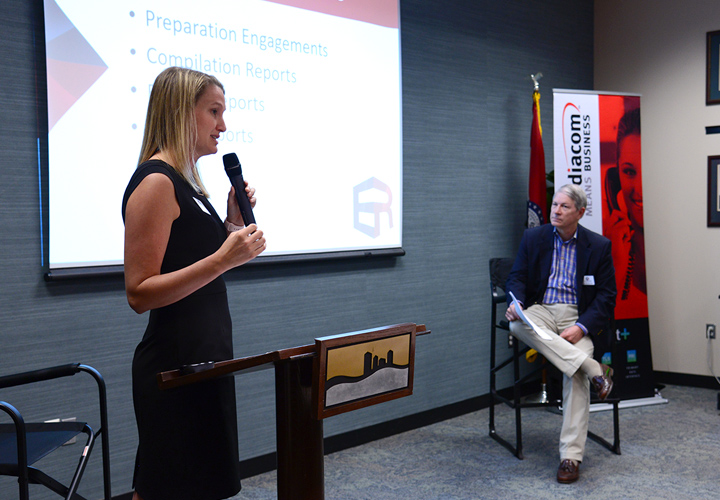Getting the edge on understanding financial statements

Knowing how to interpret your organization’s financial data is key to long-term fiscal stability … but it can also be one of the most daunting and difficult parts of business operations.
During the June 12 edition of Expert Edge – part of the Chamber’s yearlong 60 Minutes to Success Business Workshop series – experts from Elliott, Robinson & Company, LLP, CPAs offered a wide range of tips on “Understanding Your Financial Statements.” The roughly 50 attendees represented a wide range of organizations, including businesses of all sizes and nonprofits.
After the presenters discussed the four main types of financial statements – balance sheets, income statements, retained earnings statements and statements of cash flow – and what is included in each, they moved on to discuss an organization’s basis of accounting: how you determine the method you’ll prepare your books.
The “ultimate,” according to CPA and Partner Tom Everett, is Generally Accepted Accounting Principles (GAAP). “Under GAAP, the rules are the same whether you’re General Motors or a small business in Springfield,” he said. “Small companies can exempt out of a few of the requirements of GAAP, but not many.”
Because of the stringent GAAP rules, many small organizations, including nonprofits, will choose a different accounting basis. Everett said this is completely fine as long as the organization is consistent.
Other options include income tax basis, centered around estimating the organization’s tax liability; cash basis, which is all about the amount of cash on hand at a given time; or the “Financial Reporting Framework for Small- and Medium-Sized Entities” (FRF for SME), which is similar in nature to GAAP but designed specifically for smaller businesses.
Another key aspect of financial statements is knowing how to review and present them. Kyrie Stewart, CPA and manager with Elliott Robinson, said reviewing financial statements is much easier if your data is laid out side-by-side for easy comparison and you’re consistently confirming the amounts on your balance sheets.
This also makes it easier to present information from your financial statements … but Stewart warned the key to a financial presentation is knowing your audience.
“Are you presenting to a board of directors? If so, you want to stay as high-level as possible, because most board members don’t need or want minute detail about the financials,” she said. Provide a basic summary for the month, review highlights and any unusual variances, and be prepared to answer any questions, she added, but avoid unnecessary minutiae.
And one other item to consider when it comes to financial statements: annual or special reports from your accountant. There are really four general types of reports: preparation engagements, compilation reports, review reports, and full audits.
The presenters noted that most organizations assume they need an audit – and most of the time, they really don’t. “Don’t assume the bank needs a full audit to approve your loan or your financial plan,” Everett said. “Often, a compilation or review is sufficient – and it’s going to cost a lot less money and time for you and your accountant.”
Note: Mark your calendar for the next event in our 60 Minutes to Success Business Workshop Series on August 20, when experts from Google will be joining us in person to help your business “Get Found Locally on Google Search and Maps.”

